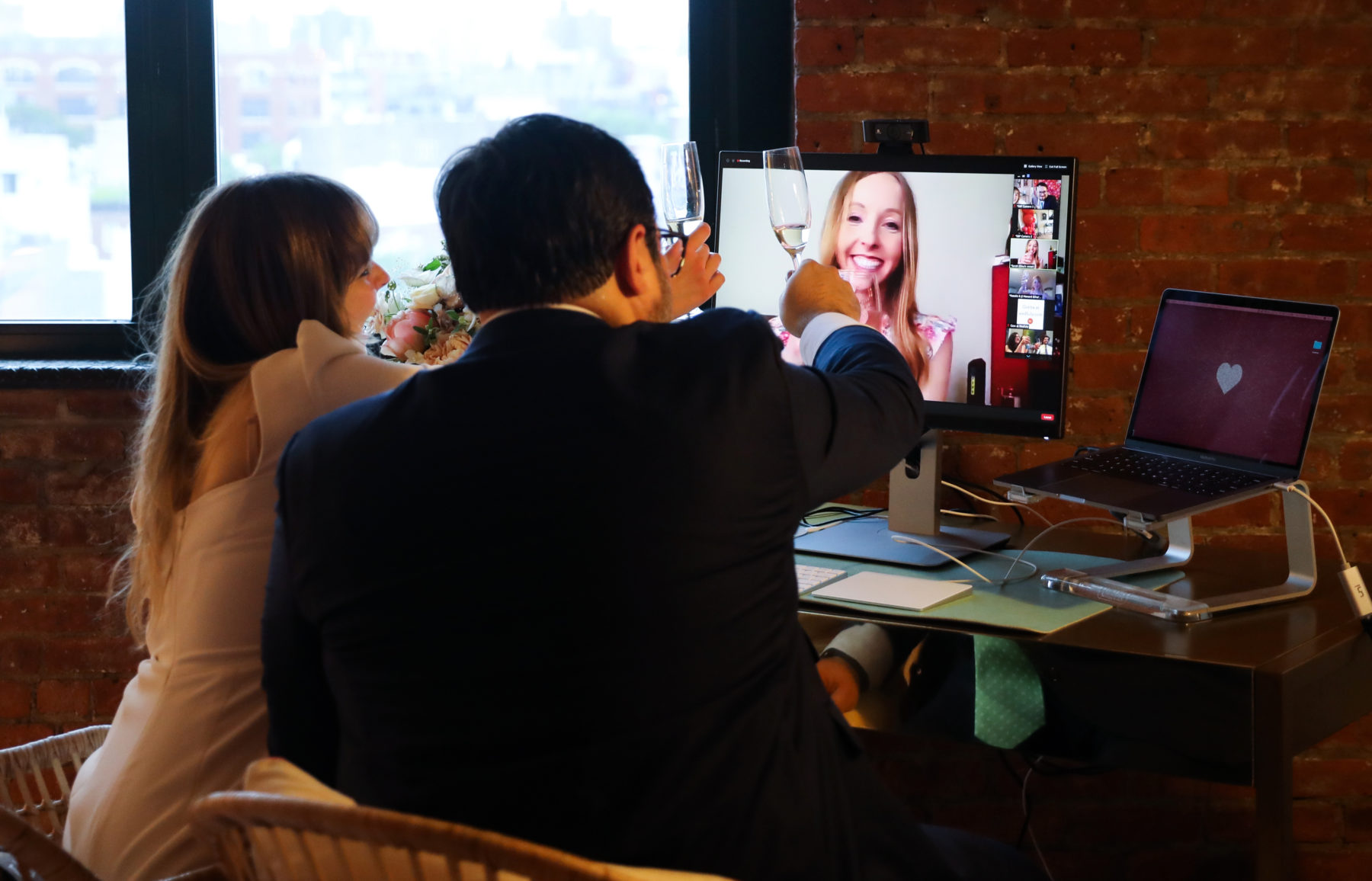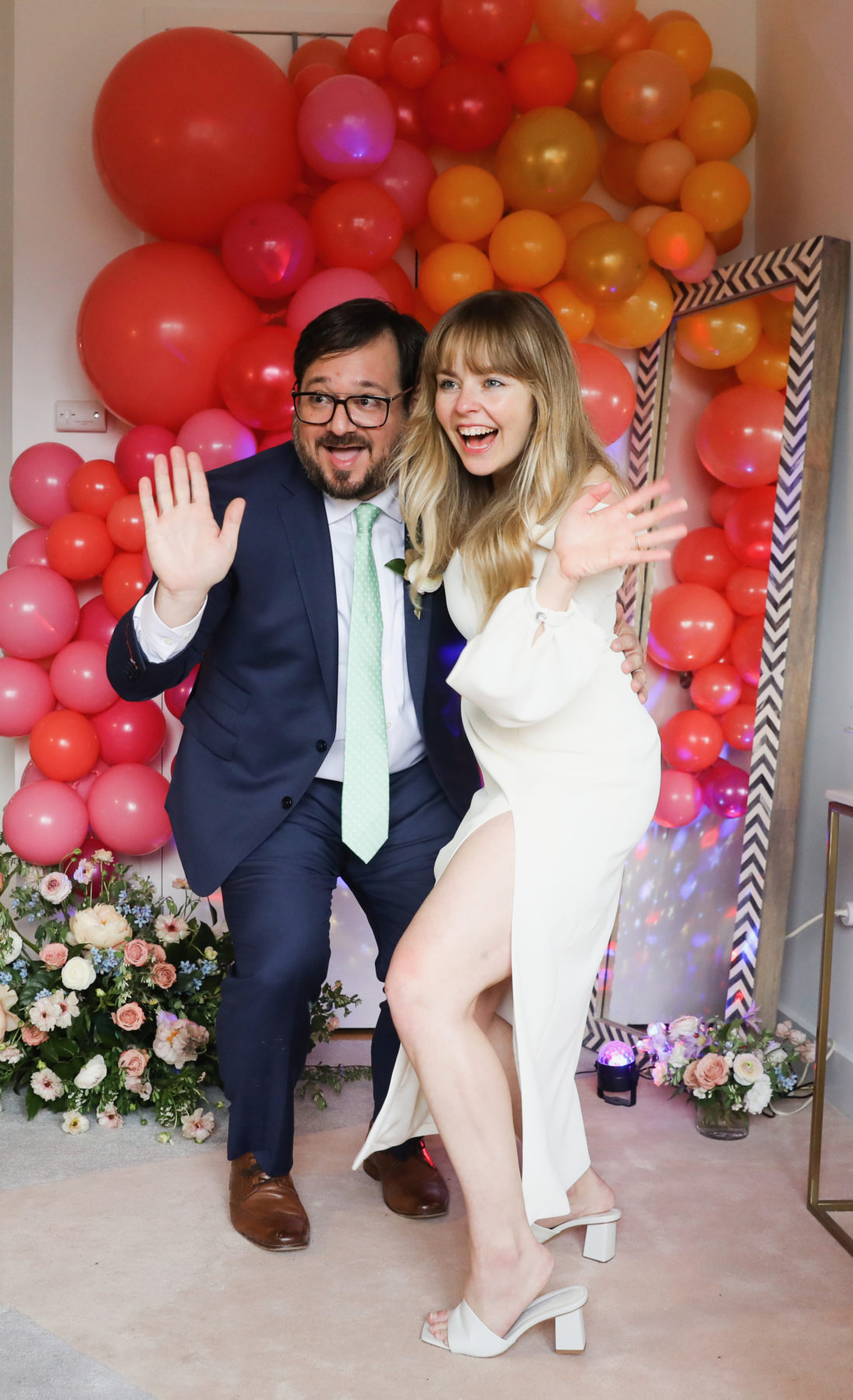In March 2020, when New York Gov. Andrew Cuomo announced a pandemic-induced moratorium on weddings, an almost primal scream rose from many brides and grooms as months of careful planning fell apart. But from others, there escaped a barely audible, yet equally powerful, sigh of relief.
“There were things I disliked about regular wedding planning, I just didn’t know how to articulate it at the time,” said Elisa Benson, 37, of Brooklyn.
Benson and her fiancé, Peter Gaston, pivoted to a small rooftop ceremony at their Williamsburg apartment building. A handful of guests attended in person, and hundreds more tuned in online–triple the original guest list.

Her 91-year-old grandmother, who wouldn’t have been able to travel to a traditional ceremony, now had a virtual front-row seat. “That was a highlight for me,” Benson said, smiling.
Benson wasn’t alone. At a time when public health concerns make traditional gatherings difficult, brides and grooms are increasingly incorporating virtual components into their ceremonies to accommodate guests. And while hybrid weddings may seem provisional, industry stakeholders caution against writing them off as just a pandemic workaround.
“There will always be people, who for whatever reason, can’t travel,” said Caroline Creidenburg, the founder of virtual production service Wedfuly. Creidenburg’s company alone has produced more than a dozen weddings per week since the onset of the pandemic.
Across New York City, priests, rabbis, imams, and interfaith ministers report a surge in hybrid weddings.
“If anything, the shift [to hybrid-virtual ceremonies] has allowed us to reach communities who may not have had access to clergy as readily,” said Rabbi Avram Mlotek, director of the virtual program Rabbis Within Reach.
Even industry heavyweights whose businesses are modeled around extravagant gatherings have noticed a shift.
At ABC Bridal Consultants, roughly one in four upcoming weddings have a virtual element, said president David Wood, and he expects that the proportion will only increase.
“Livestreaming has become a big part of events,” he said.
Benson and Gaston had planned to marry in June 2020 in front of a group of about 100 friends and family at the Industry City complex in Brooklyn. But as weeks in lockdown passed and they grew used to sirens wailing past their window, the couple realized they needed a backup plan.

Determined not to push the wedding back, Benson and Gaston began researching alternatives and stumbled across Wedfuly. “We decided to jump in with both feet,” Gaston said.
The couple were married a month ahead of schedule, and the day turned out to be better than they could have imagined. With the virtual option, they could welcome almost 300 guests without sacrificing any intimacy. The new guest list included not only elderly family but also the youngest members.
“It was so joyful having all the little nuggets running around, especially during the dance party, but it’s not something we would have been able accommodate originally,” Benson said.
Afraz Khan, executive director of Muslim Wedding Service at the NYU Islamic Center, also likes the changes forced by the pandemic.
“Weddings [with a virtual component] are much easier logistically and financially to plan, especially for couples with family members scattered across the country or even the globe,” Khan said.
The Muslim program offers hybrid weddings at about half the cost of a traditional ceremony. As a result, the service was involved in more weddings in 2020 than the year prior, and fewer couples needed financial assistance.
“I do think [hybrid] ceremonies are here to stay,” Khan said.
This March, almost exactly a year after the lockdown began, large-scale wedding receptions of up to 150 guests were allowed to resume in New York. But many venues found they were opening their doors to a changed industry.
“It’s never going to be exactly the same,” Wood said. “The remote option is here to stay. To what extent? We’ll find out.”
About the author(s)
Gretchen Tarrant is a print journalist currently based in Manhattan. Born and raised in Colchester, Vermont, she earned a bachelor’s degree in political science from Yale University while playing varsity ice hockey and lacrosse. Her past experience includes roles in finance, e-commerce, and marketing. An aspiring author and entrepreneur, she loves running, traveling and anything Trader Joe's. She can be found on Instagram: @gtarrantt, Twitter: @tarrantgretchen or reached via email: gretchen.tarrant@columbia.edu.



